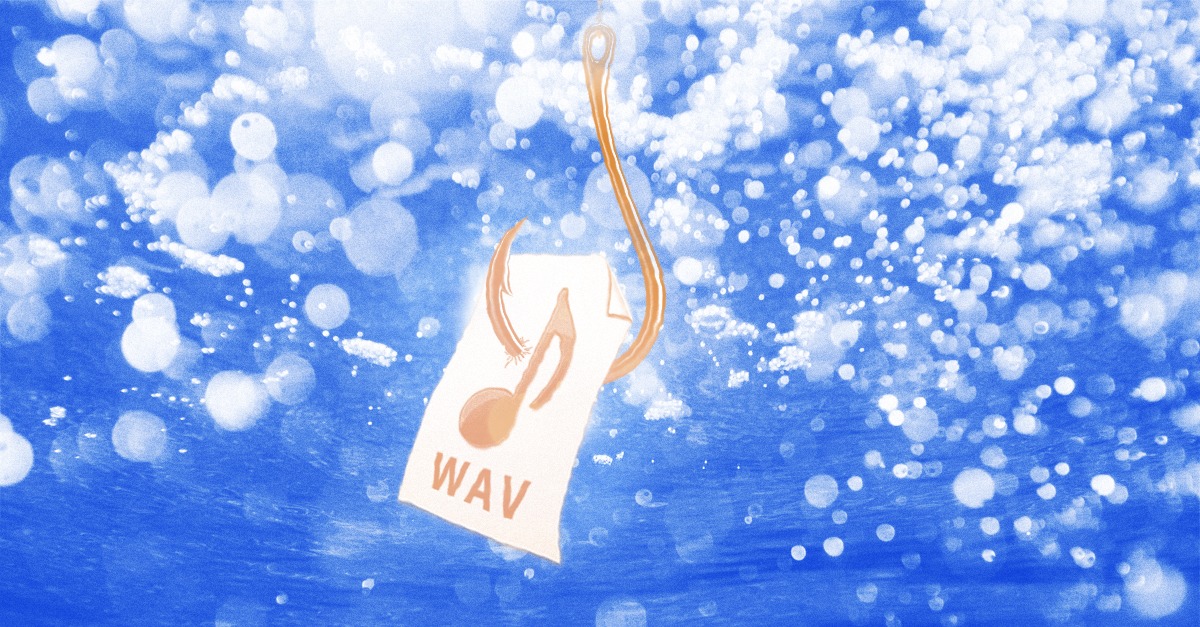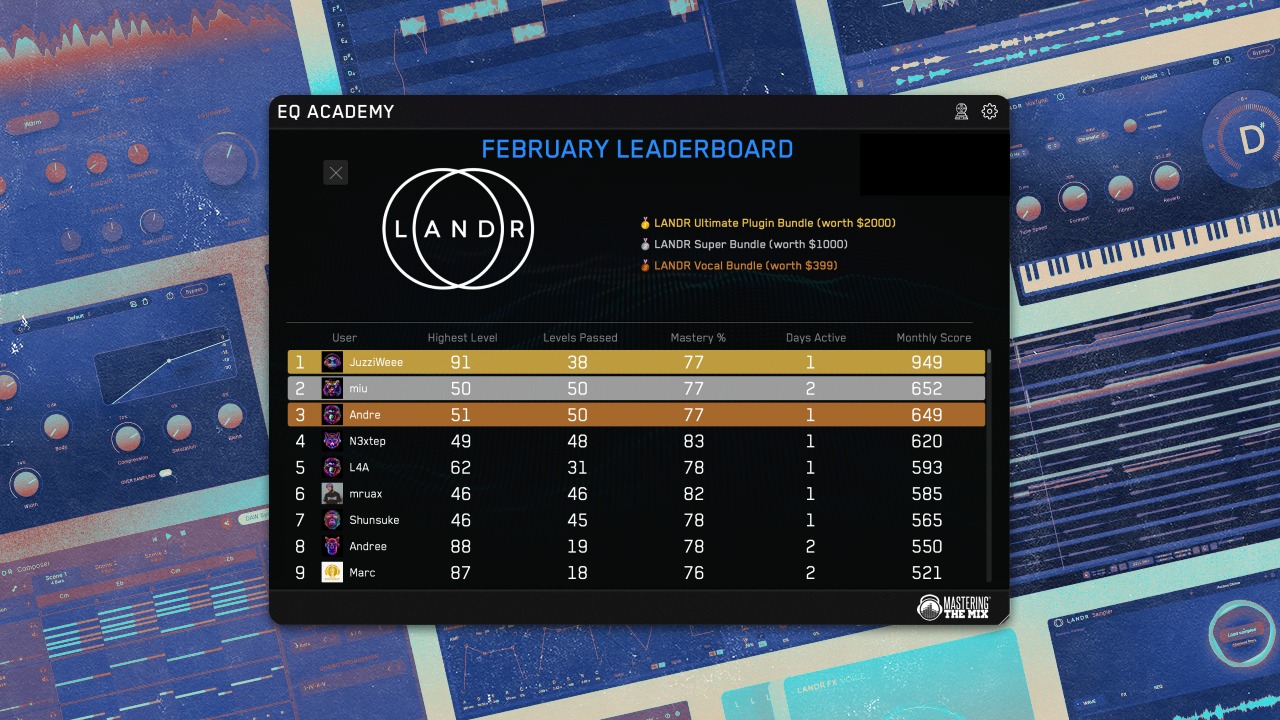
Song Hooks: 6 Ideas to Help You Write Catchier Music

Ever find yourself humming a song you heard years ago in the shower? That song probably has a really catchy hook.
Writing hooks into your music is important.
Your audience is listening for one, and if they don’t hear something they can latch onto they won’t remember your track.
But how do you write something catchy? It takes skill and creativity to write a memorable vocal line or instrumental melody.
In this article, we’ll look at how hooks work in music, concepts to keep in mind when writing them, and ideas to bring your creative identity into your hooks.
What is a hook in a song?
In music, a hook is an idea, usually a short riff, melody, or phrase, that is designed to catch the listener’s attention. Just like a fisherman uses a hook to catch fish, musicians use hooks to ‘catch’ listeners, engaging their ears and keeping them hooked throughout the song.
Hooks are typically catchy and easily memorable. They can be lyrical, rhythmic, or melodic, and are often repeated several times throughout a song, increasing their memorability.
A good hook is simple enough for listeners to remember after just one or two listens, yet distinctive enough to stand out in the sea of music.
While hooks are found in virtually all types of music, they are particularly crucial in pop, hip-hop, rock, country, and R&B, where the success of a song often hinges on the strength of its hook.
In these genres, hooks often occur in the chorus or at key points in the verse to create memorable moments that resonate with listeners.
Hooks can take many forms. They can be a memorable guitar riff, like the opening of Deep Purple’s “Smoke on the Water”, a catchy lyrical phrase, like the “Just a small town girl, living in a lonely world” from Journey’s “Don’t Stop Believin'”, or a compelling rhythmic pattern, like the iconic bassline in Queen’s “Another One Bites the Dust”.
Ultimately, a hook is a powerful songwriting tool that can capture and hold a listener’s attention, making your music more engaging and memorable.
Understanding what a hook is and how it works is an essential part of the songwriter’s toolkit, allowing you to craft songs that truly resonate with listeners.
The psychology of song hooks
Understanding the psychology behind why certain hooks capture our attention can provide invaluable insight into the songwriting process. When we delve into the science of our brains, we can uncover the elements that make a hook truly unforgettable.
A significant factor in a hook’s effectiveness is our brain’s love for pattern recognition.
Our brains are wired to recognize and remember patterns, be it in nature, visual design, or, in this case, music.
When a melody, rhythm, or lyrical phrase repeats in a song, it forms a pattern that our brains can latch onto, making the song more memorable.
This is why repetition plays a crucial role in crafting a catchy hook. By repeating the hook throughout the song, you’re essentially creating an earworm that can keep your track playing in the listener’s mind long after the song has ended.
Good hooks have a powerful way of eliciting emotional resonance. We know music has an innate ability to stir our emotions, and a well-crafted hook can encapsulate the emotional essence of a song.
This emotional connection can create a sense of familiarity and relatability, making your song resonate more deeply with listeners.
Whether it’s a joyful, upbeat melody that uplifts the spirit, or a melancholic lyric that tugs at the heartstrings, the emotional impact of a hook can leave a lasting impression.
How to write a catchy hook for a song
The biggest thing to keep in mind when trying to write a hook is that it needs to be simple.
The biggest thing to keep in mind when trying to write a hook is that it needs to be simple.
Your goal should be to make your hook so memorable the audience can remember the lyrics and sing along to the melody.
If you find yourself humming the hook almost subconsciously you’re off to a good start.
Keep your hooks melodically simple
Your audience most likely won’t be able to remember a complicated modal jazz run!
Most hooks you hear on the radio don’t use more than three or four notes.
In fact, there’s plenty of examples of massively successful pop songs that used only two notes in the hook.
Limiting the number of notes you use, and keeping them close together in the scale of the key of your song makes your hook easy for the audience to sing along to.
That doesn’t mean the rest of your track can’t use interesting chords and melodies.
Just remember that if you want your track to have a catchy hook, it needs to be melodically simple so anyone can easily remember it and sing along.
Use relatable lyrics that mean something to everyone
If the whole goal of your hook is to make something people will sing to themselves in the shower, the lyrics must be memorable.
There’s plenty of ways to write memorable lyrics.
There’s plenty of ways to write memorable lyrics.
You’ll hear relatable statements about love, romance, or heartbreak in many hooks.
Other song hooks are humourous and might even use a punch line.
Many hooks are memorable because they use melodic syllables that even easier to sing than words, or they cleverly rhyme.
Some song hooks might even invent entirely new words or terms like Party Rocking or YOLO.
Think about basic human needs when writing your song hook.
The one thing about every famous hook is that it addresses something that most people can relate to.
Lyrics about our instinct to communicate, be loved, feel young, tap into spirituality, be afraid, be happy, celebrate holidays and life events, or be sad are time tested places to start.
Repeat the hook
Repeat it over and over.
Sure, your hook might be so good you only need the listener to hear it once for them to remember it.
Even so, your song should repeat its hook multiple times.
Your song should repeat its hook multiple times.
That’s because using repetition increases the chances of capturing someone’s attention.
And of course, if your hook really sounds that good your listeners will want to hear it repeated throughout the song.
Human ears crave repetition. It’s scientifically proven that our brains love hearing pleasing rhythms and notes repeated over and over.
It’s key for sticking your hook in a listener’s memory.
Hook vs chorus
Your hook is not necessarily the chorus
There’s even a common misconception that a song’s hook is always in the chorus.
And while many hooks do appear in the chorus, it’s not always the case.
A song’s hook can happen anywhere.
When you think about it, to capture a listener’s attention right away the hook should come sooner than later.
Some of the most famous hooks in history are the first thing you hear in the track. I’m looking at you Ice Ice Baby.
The other problem with relying on your chorus to be the hook is the chorus is often written to be a little bit too long to be a hook.
Usually, a hook is no more than a few measures long, no more than one or two sentences.
For good reasons your chorus should be a little bit longer, it’s meant to deliver the core meaning and be the crux of your track.
A chorus will often elaborate on the song’s hook, which is why many hooks are found in the chorus.
Sample and chop your hook
Today sampling and chopping is an important music production technique, so you’d better believe that it’s used on a lot of hooks in popular music.
There’s even entire websites devoted to offering royalty-free vocal hooks that you can take and chop into your own tracks.
When you have a hook ready for your track, play with it a little bit in your sampler.
Chop it up, reverse it, pitch it up and down, put effects on it! Just have fun and be creative.
So many producers use this technique on their hooks, and it makes sense.
Every time you put the chopped and screwed version of your hook into your track, you increase the chances of someone remembering it.
Every time you put the chopped and screwed version of your hook into your track, you increase the chances of someone remembering it.
Song hook ideas
There’s tons of inspiration and ideas out there for song hooks.
Taking notes from a few big-name artists I came up with this list of song hook ideas.
1. Combine genres
Combining genres in your song’s hook is a great way to capture the attention of multiple audiences.
One very recent example comes from Lil Nas X’s Old Town Road which was a massive hit in 2019.
The song did an excellent job of combining both country and hip hop into a singable hook that everyone could recognize instantly and sing along too.
Collaborating with country star Billy Ray Cyrus in later remixes didn’t hurt the track’s ability to cross audiences either.
2. Use an instrumental hook
Who says a hook has to be a vocal part?
Sometimes an instrumental section works to hook the audience in.
A great example could be Phil Collins’ bombastic drum fill in in I Can Feel It Coming in the Air Tonight.
Whenever you hear that drum part come in, you know exactly what’s coming next.
We’ve all seen someone we love air drum this part at a party, it’s just so easy to follow along to.
3. Write an anthem
Anthemic hooks are the ones that just so fun to sing along to.
My favorite example is Sweet Caroline from Neil Diamond.
The lyrics are so, so simple especially with the Oh-Oh-Oh part.
It’s the kind of hook that can get the entire stadium singing at a sporting event.
4. Invent a new word
Sometimes inventing a new word is necessary to communicate something deeper about your hook and your track’s message.
In The Motto, Drake is credited for inventing the viral internet term YOLO, which stands for You Only Live Once.
Creating a simple acronym that represents a carefree and risk-taking attitude towards life was enough to capture the attention of the world and turn the track into a massive hit.
5. Use singable syllables
Words aren’t always the part of your hook that matters, there’s plenty of great examples of melodies sung in syllables that worked perfectly to get the audience engaged.
One reason this song hook writing tactic works is because it removes language barriers.
If anyone can appreciate and even sing along to your hook, you have a much bigger audience.
One such example might be The Beatles’ Ob-La-Di, Ob-La-Da.
It’s instantly catchy and fun to sing along to. I’m sure you’ve had this one stuck in your head before.
6. Use a really simple melody
A lot of today’s pop vocals make use of very simple melodies.
It seems like songwriters are looking for ways to take out notes, instead of adding them.
Post Malone uses this tactic in a lot of his hook writing. In his song Rock Star, you’ll find repeated two-note melodies through most of the track.
It’s an intentional move to make the song easy to remember and sing along to.
Hook, line and sing’er
Songwriting isn’t easy, it takes a lot of practice and skill to create something memorable.
But that doesn’t mean you shouldn’t try, it just means you’ll have to put in practice time.
Start experimenting and sharpening your ears for characteristics in your tracks that could work as a catchy hook.
Sometimes it’s best to just throw all the rules out of the window and create something fresh that’s uniquely yours.
Your best bet is to be authentically you as you write your songs, as long as you’re consciously writing hooks into your music your tracks will find their way into your audience’s ears.
Gear guides, tips, tutorials, inspiration and more—delivered weekly.
Keep up with the LANDR Blog.





